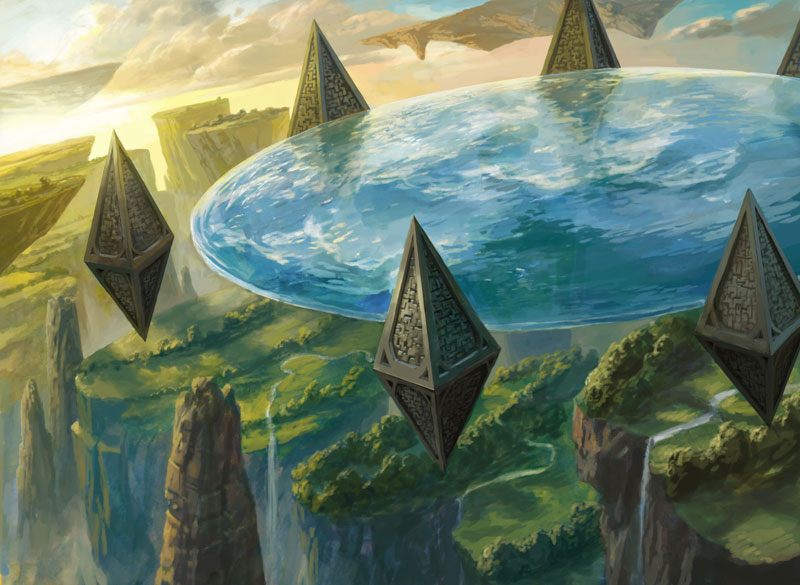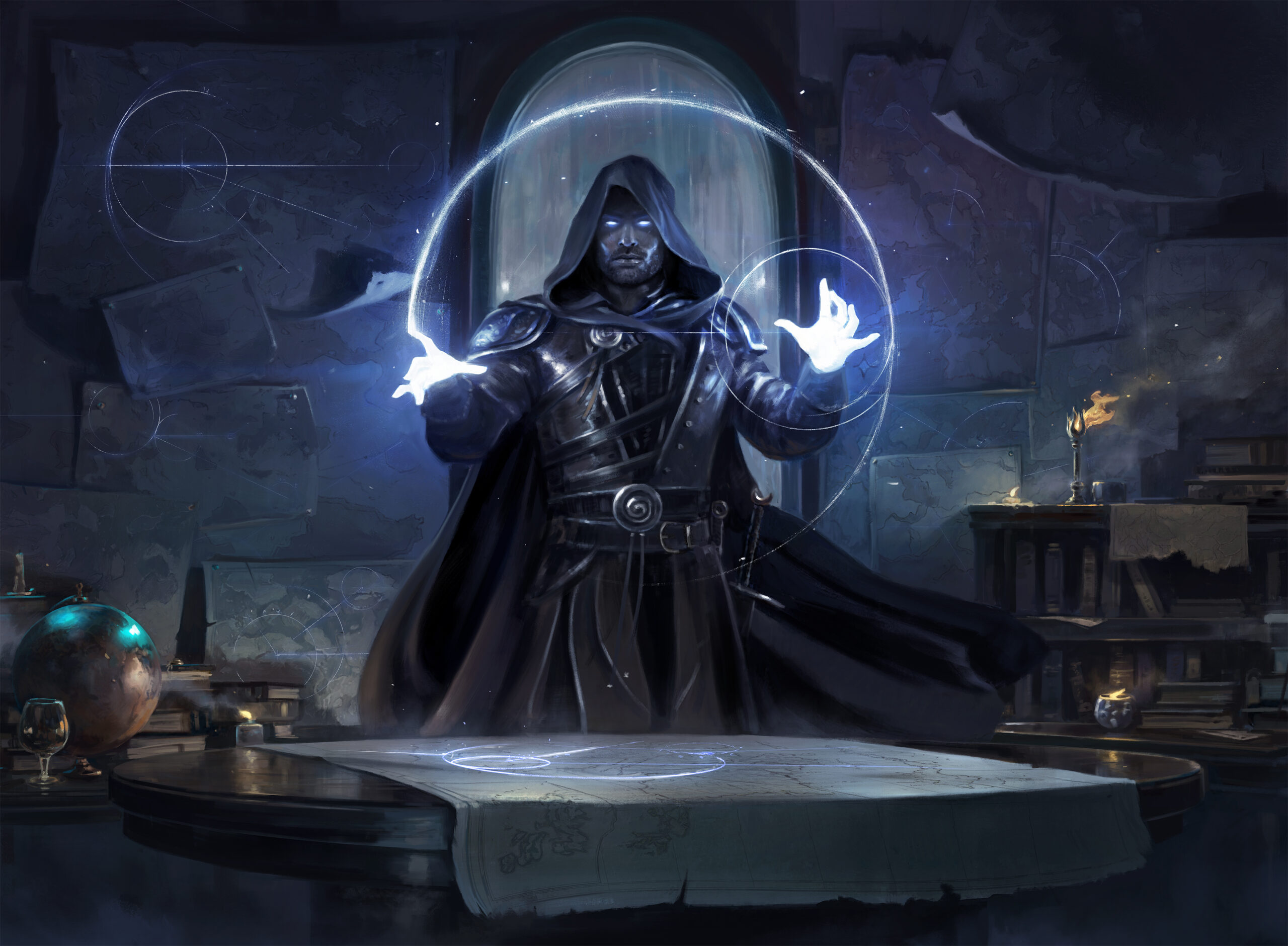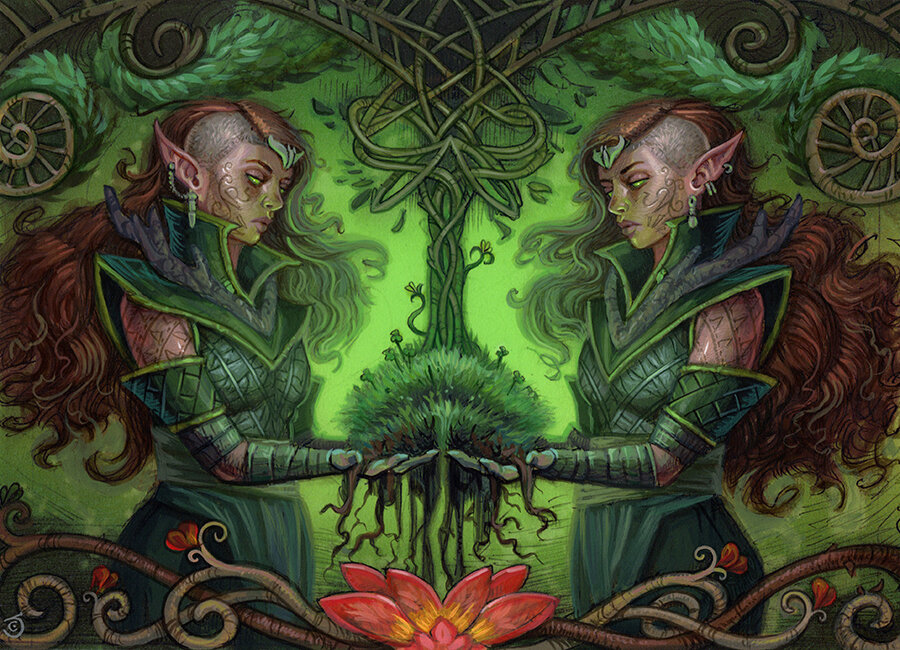Cover Image: Meditation Puzzle by Mark Winters
At any Commander table, we’re bound to see a conversation happen before a game starts. It sets expectations for all players involved, so they’re in agreement over the experience they’re about to have. There has been plenty of debate over what this pre-game talk should entail, whether it be about deck power level, how you plan on winning, if proxies are acceptable, or if you run cards like Armageddon.
While this is a good talk to have with your fellow players, one of the most important and understated aspects of Commander comes after a game. I’m talking about self-reflection, when a player reviews their decisions and decides if they were worth it. These decisions can range anywhere from the deck they put up for the game, how they played it, or the inclusion of particular cards. Self-reflection shapes a lot of how the format ebbs and flows, as well as how players feel about their Commander experience.

Reflecting Pool by Peter Mohrbacher
Self-Reflection in Winning
There have been many attempts to create power tiers in Commander, and while they all come from good intentions, we’ll never be able to truly stratify the format. If we’re ranking on a scale of one to ten, one person’s six might be another person’s eight, and so on. This is especially relevant in an era of webcam Commander with strangers, who can have wildly different views on power level. People are bound to make mistakes in that part of the pre-game conversation, so this is where post-game self-reflection comes in. Typically, it’s done after a player wins, because no fourth place finisher asks themselves, “Was this deck too good for this setting?”
There are tons of different questions you could ask yourself, but for the sake of brevity, here are four common starting points.
“Did I win by too much?”
Winning a game of Commander pretty much always feels good. But, if the deck you chose turned out to be much stronger than the others, it could feel like you’re Usain Bolt looking back on the rest of the sprinters. It helps to mentally deconstruct the win, looking at the various steps that got you there. Were you ramping more than your opponents? Were you drawing more cards or playing more removal than them? How much of the game did you spend in first place?
All of these questions add up to an answer on if you feel your deck choice was too strong for the table. For certain situations, it can be difficult to get a good reading on this, since 100-card singleton can produce a lot of variance from one game to the next. If you’re new to the format, that gut feeling will come with time and experience. Personally, I tend to change decks immediately after a win, regardless of circumstances. It removes any second-guessing of myself, and gives me a fresh challenge for the next match.
“Did my deck have a good matchup against the rest of the field?”
Some decks are just good against others, and that will cause for some slanted matchups. For instance, a Muldrotha, the Gravetide deck will love playing against one led by Bruvac, the Grandiloquent. However, players can usually recognize this problem waiting to happen, and they can change decks accordingly. Other one-sided matchups might not be as obvious, though, but they’ll come out in gameplay. For those moments, it helps to ask yourself, “Was this a fluke, or if we continued to play with these decks, would we keep getting the same play patterns?”
“How do I think my opponents feel about playing against this deck?”
This is a tricky question to navigate, since fun is a very subjective feeling. Some groups want fun to be had by all, and some prefer a more competitive zero-sum game. In my experience in social games of Commander, I’ve found that if people are chatty, laughing, and able to play their cards, odds are good that they’re having fun. It’s when I seem to have the answers for everything, or surge ahead repeatedly, that I ask myself, “Is this the kind of thing I’d enjoy playing against?” If it seems like the deck concept isn’t going over well, it’s not that you should feel guilty about having the deck, but rather that it might not be the right deck for that point and time. There’s a place for everything in Commander; it’s all a matter of aligning your choices with the group you’re in.
“Did I get lucky there?”
You might have opened the best seven-card hand of your life. Your opponents might have stumbled more than you, or they might have whiffed on cards like Goblin Ringleader. For whatever reason, sometimes a win comes through sheer happenstance, and the game is over before you know it. This can happen in all facets of Magic, so it can help to treat these games as more of an exception, than the rule.
There’s a fine line to tread here, though, because a fast win doesn’t always imply luck was involved. For instance, if you open with Mana Crypt and Demonic Tutor with Force of Will backup, and you’re sitting across the table from decks like Ishkanah, Grafwidow Spider Tribal, then odds are good that the matchup is going to play out similarly the more you repeat it. Tutor-heavy decks have a smoother pathway to victory than others, so if it’s overall easier to find any card in your deck, it’s easier to feel like you are getting great draws. Once again, though, this can be ironed out in pre-game discussions, to keep it from happening in the first place.

Rhystic Study by Paul Scott Canavan
Self-Reflection in Deckbuilding
After game night is over, it’s perfectly normal to question your deckbuilding choices. For instance, you might ask yourself:
- Was this card worth playing?
- Was this strategy right for the environment I was in?
- Is this the right angle to take for this Commander?
Having these kinds of internal discussions can help your decks feel more malleable, giving you the flexibility to change them as time goes on. It doesn’t take long to find someone who has considered cutting cards like Sol Ring, Rhystic Study, or Smothering Tithe from their deck. Some players are beginning to have those thoughts about newcomers like Hullbreacher. Whether you question a new addition, or an old standby, it helps to keep an open mind about the choices you make in deckbuilding; no card choice should be off-limits.
Recently, I was faced with a difficult decision about one of my Commander decks, The Mimeoplasm. It is built around Primal Surge, and it wins by putting my entire deck into play on one turn. While it feels awesome to win like this, I’ve noticed that I keep passing it up on my weekly webcam Commander games. The reason being is that I’d look at the deck box and think, “Do I want to play another game where I try to get everyone with Primal Surge?” For as fun as the win would feel, I faced the reality that my game plan for each match was rather linear and boring: dig as fast as you can towards your best card, play it, and win if no one counters it.
Self reflection caused me to ask those hard questions of myself, and realize that I shouldn’t keep putting Primal Surge on a pedestal in my mind. In the end, the only thing keeping Primal Surge in the deck was the fact that it had always been in the deck. “That’s how we’ve always done it” is one of the most powerful thoughts that stands in the way of change, so I decided that it was time for something different.
Not every deck can be completely changed off of one card, but self-reflection can still help you shape and refine your builds. This might be in the form of “checking the box,” where you accomplish a certain goal with your deck, and then decide to move in a different direction. It’s not unusual to be excited about winning with a certain card, only to then feel that high wear off quickly afterwards. When I think of this “bucket list” concept, I think of two-card combos like Exquisite Blood+Sanguine Bond, or Godo, Bandit Warlord+Helm of the Host. Just because the excitement wears off quickly, though, that doesn’t mean you shouldn’t go for it at least once. It’s healthy to get it out of your system, because then you can explore new directions with your deckbuilding.
I spent weeks designing a four-color Humans deck that wins off of Hermit Druid, Dread Return, and Angel of Glory’s Rise. I won a single game with the combo, then decided to scrap it for parts. Do I regret it? Not at all. Coincidentally, it felt a lot like my aforementioned Mimeoplasm deck. I landed on the fact that I didn’t want to have too many decks doing the same thing. I asked myself, “Why am I doing this, really?” It came from a motivation to try and prove that one of my all-time favorite creature types could be viable in Commander, even though Humans decks still have a long way to go.
It’s been a month since I did that, and I still don’t think, “I miss playing Saskia Humans.” So I know I made the right decision at the end of the day, despite it being so short-lived. Whatever your reason for changing your deck may be, there’s nothing wrong with deciding that it’s no longer for you.

Mana Reflection by Chris Seaman
Moving Forward
Self-reflection is an important, powerful aspect of the Commander experience. It helps keep us coming back for more, by ensuring that our experience stays fresh and exciting. While there are many different ways to reflect on your decisions, it’s important to do so in a healthy, constructive way. You may not have an answer immediately, but time will help point you in the right direction.
You shouldn’t try to force this on someone else, because ultimately that decision has to come from within. Self-reflection starts with you. Regardless of when or how you make your decisions, thinking about them in the first place is what counts.
Travis is a Virginia-based player and writer, who has been turning things sideways since Starter 1999. He primarily plays Commander, Pauper, and Legacy, and has a passion for introducing new players to the game. When he isn’t making people pay the Thalia tax, he can be found mountain biking or playing the guitar. You can follow his exploits here on Twitter and Instagram.

